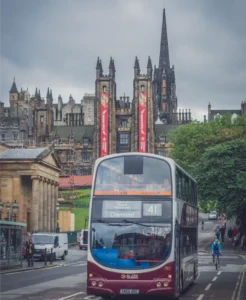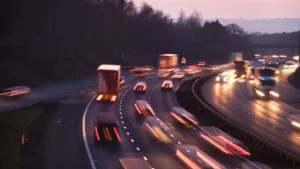Traffic reduction measures will have to be implemented more widely across the UK if the Climate Change Committee’s recommendations for targets to decarbonise the sector.
This is according to a new report by think-tank Green Alliance that said introducing traffic reduction measures will provide ‘certainty’ that the UK can cut emissions to necessary levels over the next decade.
The report said: “Traffic reduction will also bring other major health and economic benefits to communities across the country, including cutting congestion, improving air quality and encouraging more active travel.
“Some progress on traffic reduction has already been made in parts of the UK, for instance: the Scottish Government has a target to reduce miles driven by car by 20% by 2030. This is an example of an ambition that could be adopted more widely across the UK to reduce traffic levels.”
It also said it will take more than a move to electric vehicles to bring down transport emissions
The report looked at fast, medium, and slow electric vehicle (EV) sales trajectories in the period up to the UK’s 2030 ban on the sale of new petrol and diesel cars.
The researchers found that, even under the medium sales trajectory, which the government thinks is most likely, the average annual mileage per car would have to fall by around 1,700 miles if emissions targets are to be met.
Under the slow sales trajectory, the annual average mileage per car would need to be cut by almost 30%, or 2,300 miles a year fewer, to keep emissions on track.
To be sure that the UK can hit its emission reduction targets, Green Alliance recommends that the government introduce more measures to help drivers switch to walking, cycling and public transport.
The report went on to say that in a future where both GDP and the population grow, the DfT has predicted that road traffic will increase through improved innovation and lower costs. But this prediction does not anticipate measures to reduce car travel.
“The CCC’s ‘balanced pathway’ uses the DfT’s forecast as a baseline. It assumes policy will lower demand for private motor vehicles to a limited extent, although it predicts there will be a net rise in traffic in 2030 compared to current levels.
“If the government acts swiftly on its transport decarbonisation plan to roll out comprehensive charging infrastructure and introduce ambitious annual sales targets in its zero emission vehicle mandate, it is feasible that electric vehicle numbers will increase in line with the CCC’s predictions.
“Greater effort to reduce traffic (beyond that recommended by the CCC) would be a practical step to lock in lower emissions without relying solely on EVs and would insure against a slower rate of uptake. Reducing traffic can be achieved by reducing the number of cars, the miles driven by each car or a combination of both. We have analysed the impact of cutting traffic by reducing miles driven (rather than the number of cars on the road).”
The report calls for local government to be given the autonomy and funding to roll out more charging infrastructure and improve connections between areas, reducing the need to use cars for journeys across local authority boundaries.
It also asks for more Fund and support public transport infrastructure, especially in rural areas, to improve services, cut
congestion and make public transport an attractive alternative to car use, as well as to prioritise public transport and active travel.
























